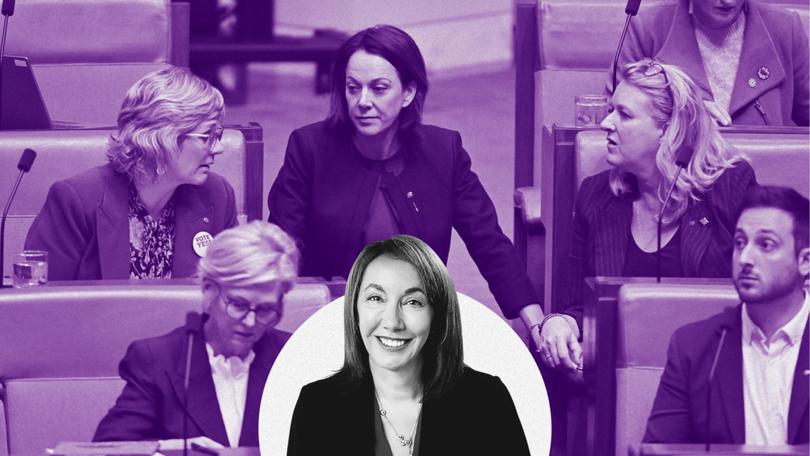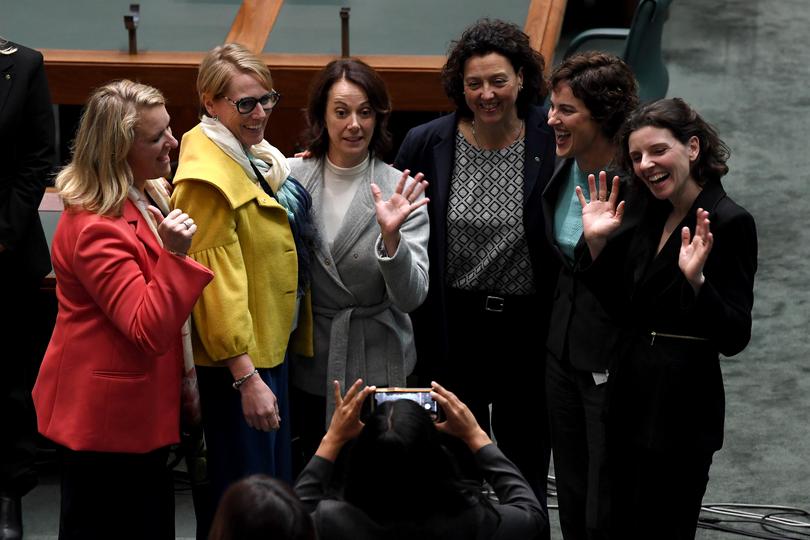JENI O’DOWD: Teal MPs would do better tackling real misogyny rather than whinging about Question Time
JENI O’DOWD: Instead of whining about being called names, perhaps these Teal MPs should take a leaf out of the book of one of their former colleagues.

The trouble with today’s woke society is that when certain women don’t like something, they often bring gender into it.
It’s become almost predictable: when a woman’s ideas are challenged in a meeting, she might claim the pushback is due to sexism, ignoring the fact her ideas simply weren’t good enough.
Or if she is clearly not talented at her job she will tell people she didn’t get a promotion because of her gender. Or she will blame the so-called boys’ club, ignoring the fact most companies nowadays have many strong women leading them at every level.
Sign up to The Nightly's newsletters.
Get the first look at the digital newspaper, curated daily stories and breaking headlines delivered to your inbox.
By continuing you agree to our Terms and Privacy Policy.Here’s the thing: not every challenge a woman faces is rooted in sexism. While genuine inequalities like the gender pay gap and workplace harassment exist, gender should not be seen as the cause of every criticism.
Which is why I was frustrated by the complaints from three teal Independent MPs in NSW — Kylea Tink (North Sydney), Zali Steggall (Warringah), and Mackellar MP Sophie Scamps — regarding MPs’ behaviour in question time.
“I’ve become used to this type of condescending, unprofessional and often misogynistic behaviour from a number of male MPs from the Liberal and National parties,” Tink complained to The Guardian Australia.
“And it’s not just me — many people, often women, face this sort of behaviour in Parliament — the likes of which would not be accepted in any other workplace.”
When pressed later in an another interview, Tink couldn’t give any precise examples of misogyny, instead talking about men yelling and trying to shut women down.
“One of the … behaviours I and those in the crossbenches noticed is those that want to have a go at us will turn their back on the Speaker and then they will mouth things at us, mouth things like ‘you’re a disgrace; sit down…shut up’ … This is stuff you wouldn’t accept in any other workplace,” she said.
Welcome to the real world Kylea. Question time has never been for the faint-hearted — it’s an Australian tradition known for its fiery and intense exchanges.
And nobody would ever suggest it is a reflection of Australian workplaces. You can view it on live television and it’s closely watched, and reported on, by journalists from all media outlets across the country.
Yes, the exchanges can be harsh. But this is the very essence of a healthy democracy.
Calling for everyone to “play nice” not only dilutes the importance of debates but also undermines the role of question time, where the strongest arguments rise to the top amid the clamour.
Instead of whining about being called names, perhaps these teal MPs should take a leaf out of Kate Ellis’ book. In 2021, the former Labor MP and minister led a group of female politicians in lifting the lid on toxic workplace culture in Parliament House.
Their revelations included cases of blatant sexism, weaponised gossip about sexual relationships, the unfair focus on physical appearance and personal lives and much more.
“I’d only been an MP for a couple of weeks and we were out for drinks and this Liberal staffer quite aggressively just said, ‘Kate, the only thing anyone wants to know about you is just how many blokes you f....d in order to get into parliament.’ Kate told the ABC’s Australian Story in 2021.

“Just the fact that he came up and said that to my face when I was an elected MP and he was a staff member, that he still had the confidence to do that,” she said.
That, Kylea, is misogyny and true sexism. That is what you and your fellow teals should be trying to stop, rather than complaining about name-calling during question time.
The true issue isn’t the spirited debates of question time but the toxic culture that thrives behind the scenes.
Tackling these deeper, systemic problems would do more to improve the experience of women in Parliament than sanitising question time, which has never been about polite conversation or maintaining the decorum one might expect in a corporate boardroom.
And let’s not forget that some of the most famous and defining moments in Australian political history have occurred during some exchanges.
Former PM Paul Keating was the king of political theatre — remember his 1988 description of then opposition leader John Howard: “A shiver looking for a spine to run up”?
Bob Hawke called the then opposition leader Ian Sinclair “a silly old bugger” in 1986 and most famous of all, Gough Whitlam, after his dismissal in 1975, repeatedly used the phrase Kerr’s cur to describe Malcolm Fraser during question time.
The robust nature and name calling in question time is a deeply ingrained tradition in our Aussie political life. Let’s not sanitise that for the sake of a few women getting their feelings hurt.
